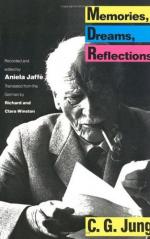
|
| Name: _________________________ | Period: ___________________ |
This test consists of 15 multiple choice questions and 5 short answer questions.
Multiple Choice Questions
1. How did Jung say the primitive people of North America kept their culture alive?
(a) By sacrificing captives.
(b) By repetition of tradition.
(c) By constant adaptation.
(d) By perpetual innovation.
2. What crafts is alchemy close to, in its practice?
(a) Blacksmithing.
(b) Farming.
(c) Glass blowing.
(d) Cooking.
3. What does the Kabala draw correlations between?
(a) Points on the body and essential qualities in the universe.
(b) Points in geography and historical events.
(c) Points in the sky and migration paths.
(d) Points in the Bible and qualities of temperament.
4. What does Jung say distinguishes Christ's story from other cultures' stories of resurrected gods?
(a) Nothing--all the elements exist in other cultures.
(b) Christ is treated as a Messiah, not a demi-god.
(c) Christ's gospel was written down.
(d) Christ lived during a time when Messiahs were anticipated.
5. What condition did Jung suffer in 1944?
(a) A stroke.
(b) A tumor.
(c) A heart attack.
(d) A surgery.
6. What was Jung's relationship with his father like at the time when Jung was integrating his fantasies with his interest in alchemy?
(a) His father was losing his superiority and yielding to Jung.
(b) His father was disgraced and discredited.
(c) His father fought with him for dominance in the family.
(d) His father's dominance in social and religious contexts was complete.
7. What was the purpose of the rituals Jung witnessed?
(a) To convince the deer and other game to return.
(b) To convince the corn to grow.
(c) To convince the sun to return.
(d) To convince the rain to fall.
8. What is the "Krater"?
(a) A mythic monster.
(b) A spritual site.
(c) A mixing bowl.
(d) A geographical feature.
9. What did Jung find when his wife died, and his children were all grown up?
(a) That the restrictions he placed on himself were no longer necessary.
(b) That he had not needed his family as much as he thought.
(c) That the desire that led him into a family did not require other things of him.
(d) That he felt no diminution from the losses.
10. What does Jung say makes it impossible for him to answer the question of an afterlife?
(a) He does not know people who have returned from death.
(b) He cannot always trust his senses.
(c) All his experience is from being alive.
(d) He is biased by his experience of paranormal activities.
11. What could Jung not have access to in North Africa?
(a) The churches.
(b) The markets.
(c) The realm of women.
(d) The private places where men retired.
12. What idea did Jung and Hegel both write about?
(a) That human history is a progression.
(b) That transcendent experiences of God are possible.
(c) That there is an oversoul in the universe.
(d) That a spirit drives history toward a conclusion.
13. When did Jung begin to build a house for himself?
(a) 1929.
(b) 1912.
(c) 1920.
(d) 1914.
14. What does Jung say he believes about life after death?
(a) He is opposed to the idea.
(b) He is certain it's possible.
(c) He has seen too many things to rule it out.
(d) He believes it can happen sometimes.
15. What happened to Jung's doctor while Jung was convalescing?
(a) He lost all his money.
(b) He died.
(c) He and his wife had their first baby.
(d) He moved away.
Short Answer Questions
1. How does Jung approach the question of an afterlife?
2. Why was Jung drawn to alchemy?
3. Whose company did Jung enjoy during his African travels?
4. How does Jung say moral judgments are made?
5. What did the primitive people of North America get Jung to see about white people?
|
This section contains 699 words (approx. 3 pages at 300 words per page) |

|




